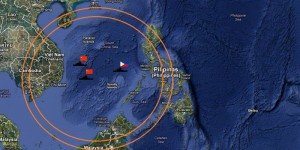PH hits China threat to int’l shipping

The Department of Foreign Affairs (DFA) on Saturday said the latest Chinese provocation should be condemned by the international community as it violates maritime domains of countries in the region and impede freedom of navigation.
“If media reports are accurate, this planned action by China is illegal and will validate the continuous and repeated pronouncements by the Philippines that China’s claim of indisputable sovereignty over virtually the entire South China Sea is not only an excessive claim but a threat to all countries,” the DFA said in a statement.
“[It] deserves international condemnation by Asean (Association of Southeast Asian Nations), our international partners and the entire community of nations,” it said further.
The DFA said it wants Beijing to “immediately clarify its reported plans to interdict ships that enter what it considers its territory in the South China Sea.”
It said the Philippines was concerned that ships entering waters claimed by China, which is “virtually the entire South China Sea… can be boarded, inspected, detained, confiscated, immobilized and expelled, among other punitive actions.”
Article continues after this advertisementEscalating tensions
Article continues after this advertisementChinese state media reported on Thursday that southern Hainan province, which Beijing says administers the South China Sea, had approved laws giving its police the right to search vessels that pass through its waters. The new rule will come into effect on Jan. 1.
Last week, the Philippines, Vietnam, Taiwan and India protested a map on a new Chinese electronic passport that depicts disputed areas as belonging to China.
The Philippine government views these actions as an assertion of China’s so-called nine-dash-line claim to virtually all of the territories in the South China Sea (the Philippines calls the portion of the waterway adjoining its territory the West Philippine Sea), including the Spratly group of islands and the Panatag Shoal, to which the Philippines has partial claims.
Vietnam, Malaysia, Brunei and Taiwan also claim all or part of the territories in these waters, which are believed to be rich in oil, mineral and marine resources.
The Philippines and Vietnam have decided not to stamp visas on the Chinese e-passports. Philippine visas will be stamped on a separate visa form for Chinese applicants.
Asean Secretary General Surin Pitsuwan on Friday criticized the Chinese plan to interdict vessels, saying it was an escalation of tensions in the region and had caused “great anxiety” among contending parties.
Too early for NSC
But because of internal differences, the 10-nation Asean has failed to present a united front in dealing with China amid efforts to resolve the issue. China, which has several allies within the bloc, has been pushing for a bilateral approach to settle the dispute, while the Philippines has been calling for a multilateral track.
Even with the latest Chinese provocation, Malacañang sees no urgent need to convene the National Security Council (NSC), which some legislators have suggested.
“There has been no discussion yet on the need to convene the National Security Council. At this point, all the agencies involved are all actively working on the three tracks that we have laid out on how to approach the issue of the West Philippine Sea,” deputy presidential spokesperson Abigail Valte told state-run Radyo ng Bayan.
The three tracks—political, diplomatic and legal—comprise the comprehensive foreign policy strategy of the Aquino administration under its “rules-based approach” to resolving the territorial disputes with China.
Valte said President Aquino was still waiting for the DFA to get confirmation on whether the new policy of Hainan province was officially sanctioned by Beijing.
“The President has given instructions to [the] DFA. Let’s see what comes out of it,” she said.
The NSC is the President’s main forum for considering national defense and foreign policy issues with senior security advisers and Cabinet officials. Its members include the defense, interior and justice secretaries as well as the heads of the Armed Forces, Philippine National Police, National Bureau of Investigation, the National Security Agency and the National Intelligence Coordinating Agency.
Policeman of the world
Sen. Loren Legarda, chair of the Senate foreign relations committee, said if the reports are true, the Chinese plan deserves the condemnation of the international community as it “undermines the right to free and unhampered passage of vessels, as provided for under international law.”
“Actions such as those do not contribute to defusing tension in the region. Can you imagine if all the claimant countries will do the same thing? That is an invitation to hostilities,” said Legarda.
Sen. Gregorio Honasan said the United States should play its role of policeman of the world, make its presence felt in the West Philippine Sea and dissuade China from pushing through with its plan to board foreign vessels.
“Any statement like that must be backed up with a show of force which we also suggested months back. It wouldn’t take much for the US to send, of course, with the consent of the Asean in which it is an active observer, a carrier fleet in the area,” said Honasan. With reports from Norman Bordadora and Michael Lim Ubac
For comprehensive coverage, in-depth analysis, visit our special page for West Philippine Sea updates. Stay informed with articles, videos, and expert opinions.